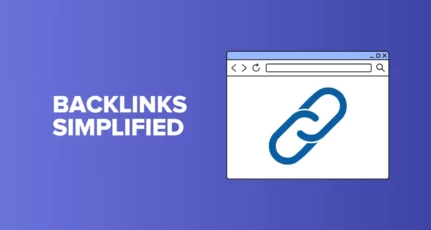
- Have you ever thought about outbound link SEO?
- Should You add a link to external sites?
- Will, it improve your SEO?
Have you considered why it’s important to have quality outbound links from your website or wondered how to produce them?
Note: External links and outbound links are the same. I may be interchangeably using both the words, in this article.
Because we’re working in a post-panda world, I’m offering up this post to help you understand the importance of outbound links for SEO.
We have already talked about how to create backlinks to your website which will eventually help in increasing the search engine ranking, but at the same time, you should consider employing an outbound link strategy to make sure your blog is never devalued.
What are outbound links?
Outbound links are links that point to some other domain from your site.
When you link out to related domains, it not only helps the search engine to understand your niche, but also helps to increase the trust and quality of your site which plays a vital role in your blog’s SEO.
Outbound links:
- Give search engines a clear idea about your blog because of relevant links.
- Offer the best way to be in touch/build relation with bloggers having the same niche.

Benefits of outbound links from the SEO perspective:
Before I describe the general benefits of outbound links, I’d like to introduce you to the Google related link operator. (This one is depreciated).
Like any other operator in a Google search, you can use Google’s related link operator to see what links are relevant to your site according to Google! A good related site link for your site will list all of the important and popular sites in your niche.
FYI, even a comment link is counted as related links, and if someone is commenting on every post published on your blog, he may even see the benefit of being featured as a related site.
You can search for “related:(your domain name).com” in Google to see related site links.

If you check related links for your site and find some spammy links as relevant links, that means you need to start building links from relevant sites to give a good signal to search engine.
Read our guide on: Blog Comments: When are they Useful and When are they Harmful?
Now that you have a basic idea of why your outbound links are so important, let’s look at the things you should consider when linking out.
Link to relevant Webpages!
A lot of users avoid adding links to their content thinking it would take away their visitors, which is not the right approach. When you start linking to relevant websites in your niche, you basically tell search engines more about your content and it creates a connection from your website to others.
Try to link up with blogs having the same niche as your blog. This will help you to attract targeted visitors to your blog. Try to link to domains that are already trusted and have good domain authority.
Avoid link farms
Avoid two-way backlinks, and when you are linking to any domain make sure it is not a part of a private blog network. Following recent Google penguin updates, Google has been taking down all such private blog networks and devaluing their links.
Avoid having too many outbound links
Having some links pointing out is fine, but having too many outbound links can be annoying from the perspective of your readers.
Try to concentrate more on internal linking, (part of Wikipedia’s SEO Strategy), and link out to only to some websites that are relevant to your page.
Link to fewer blogs and only to relevant blogs. There are some pages that link out to, for instance, “The Top 101 Websites” or “20 Forums to Follow” and other similar pages that rank well despite using multiple outbound links. But in general posts, we want to take care not to link out too much for better reader experience.
Most importantly, make sure your content is useful, and take care of on-page optimization.
Provide and ask for links
In blogging, it is beneficial to everyone to use the give-and-take system. If you have a blog post in which you refer to another author’s blog post, you should provide the link in your post.
You can take it to the next level, by letting the blog/website owner that you have linked to them.
To whom should you link?
There are many strategies that you can follow for linking out.
My suggestion is that when you want to give a reference or explanation in your post but you are not entirely sure where to link out (what information to point to as your reference) link to good resources such as Wiki. (Yes! Wikipedia is still one of the most trusted domains from Google POV!)
Here are a few suggestions for creating outbound links:
- Link to pages that actually add value and cover the topic very well.
- Link to articles having good page authority or domain authority.
- Link to articles that have got a high number of social media share. (Though do consider other factors like the authenticity of the site)
- Link to the bloggers in your network or in your niche, helping you to create a community with fellow bloggers.
One strategy we have long employed here at ShoutMeLoud is that when we use words that are useful but their meaning may not be familiar to our readers, we link to a good and reliable source, or if we have a post on that topic, we interlink to that.
Keeping bounce rate in mind, always try to make outbound links open in new tab.
Also in this post-panda world, I have noticed that most of the top-ranking pages in Google have at least a few outbound links to relevant and high-ranking pages, which helps them to boost their ranking.
What’s your strategy for outbound links, and when do you use nofollow for them?
Also, do you care about anchor text when linking out to any other page?
Outbound Links FAQs
Always focus on linking your content to relevant, trustworthy, and authoritative websites within your niche, allowing your readers to understand more about the topic. A good example is linking to Wikipedia which is considered a credible source for the majority of topics.
There is no set number, but you should maintain a balance and avoid excessive external linking, which can distract readers. Focus on seamlessly integrating meaningful, informative external links that improve the reader’s experience and provide value to them.
If you find the information in this post useful, be sure to share it with your fellow bloggers and friends via LinkedIn and Twitter.
Here are a few hand-picked guides for you to read next:
- Best Keyword Research Tools For SEO: 2020 Edition
- On-Page SEO Techniques To Rank On The First Page
- How To Write SEO-Friendly Content (Beginner To Advanced)






Thank you I really have no idea about outbounds link but now I have some clue and I can start build them slowly. Thanks a lot mate.
That is so enlightening. This has caused me to rethink my attitude on out bound links.
Thank you ShoutMeLoud!
Hi, Harsh.
Please advice me should we use outbound links as No-follow or Do-follow links and why or why not?
Hope to see your reply.
Thanks.
If you liking to a reliable source and because they derseve it, keep it dofollow. It’s like voting something that you liked on the internet.
I agree with this article, Outbound links are essential to SEO. These links come from your blog and site to another website. The purpose of these links is to bring your visitors and potential clients off your website to another site.
Thanks for this post Harsh. Would certainly implement this in my posts. I knew about outbound links but was ignoring the importance.
wow!
What a revelation. I have been going through SEO articles for many some weeks now and I must say, you have a good SEO reservoir here in ShoutMeLoud
Thanks for sharing and more $$$ to your bank account
Thank you very much for this article.
Just I need to know whether I should use follow or nofollow while linking outbound links. And second thing is do I need to take permission for linking other sites in my post, that is outbound links.
Really i loved it. But as a newbie i am having one pretty doubt. How can i identify when somebody use my link within their posts. I am sorry if it is a wrong question…
You can use buzzsumo to check links to your site.
Thanks I Was Not Having Any Idea Regarding Outbound Link..But U Cleared It Thanks Again
Thanks for this article, it has been very useful. I’m going to review all my outbound links and see how I can get them to work better for me.
Great post Harsh!
I was having a lot of misconception relating to outbound linking. This pretty pretty much help clearing them out. But I still I’m a bit confused about using dofollow and nofollow attributes.
From what i could understand using dofollow links for high authority sites are going to be helpful…right?
@Sreyaj
That’s right. Using Dofollow link for high quality or even useful sites is recommended.
I would like to add to this article. Bloggers can add links to other sources ONLY after they will have a lot of inbound links to their website.
If they start to make outbound links on a new website it will be a bad result.
Thanks for this post Harsh. Would certainly implement this in my posts. I knew about outbound links but was ignoring the importance.
İ have tryed for my site but there is nothing showed up related:sividolummakinasi.com But thanks anyway 🙂
Thanks a lot for this post. I always had a doubt about do follow and no follow links, now confusion is over. Quality links always help your website and importance of outbound links should never be ignored. Thanks again
Nice post Sir. Which tool I should use to get outbound link suggestions on a blog post?
I didn’t know How to thank you buddy 🙂 Actually i implemented this technique on my top performing post and seen oven 34% lift on organic traffic. Just ready to write an epic case-study on outbound links and let you know how it goes 🙂
I have seen many startup bloggers fail to take action they read on blogs and try to blame their luck. What do you think Harsh ?
Hey Pradip,
That’s great. Will look out for your case study. And you are absolutely right about many bloggers taking no action after reading content.
Hi Harsh Very good Article.Thanks for sharing such a valuable article.
I am using internal linking techniques where i link my blogs to various pages on the website.
This technique of outbound links seems to be very useful.Will try this out.
I have a question.Is there any possibility that the sites to which we pass outbound links blacklist us or penalize our website?Can that happen?Pls Help
Hey Nikhil,
Google will not penalize you unless and until the links are unnatural. Check the official page here:https://support.google.com/webmasters/answer/2604774?hl=en
Very informative post about the Topic!
So I have only 43 Outbound links that point to some other domain from my Site Ease Bedding.
I try my best to comment on other valuable blogs like shoutmeloud.com!!
Anyone not linking out to other websites (because they think it will end up hurting their rankings) is only fooling themselves. Websites link out to other websites all the time, it’s natural. You want your website to be as natural as possible – and that includes outbound links! Just.. don’t point them at your competitors. 😛